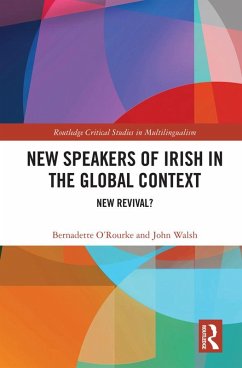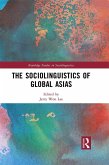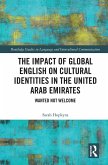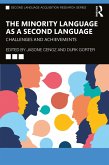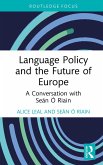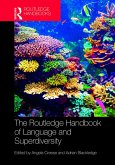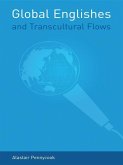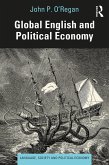43,95 €
43,95 €
inkl. MwSt.
Sofort per Download lieferbar

22 °P sammeln
43,95 €
Als Download kaufen

43,95 €
inkl. MwSt.
Sofort per Download lieferbar

22 °P sammeln
Jetzt verschenken
Alle Infos zum eBook verschenken
43,95 €
inkl. MwSt.
Sofort per Download lieferbar
Alle Infos zum eBook verschenken

22 °P sammeln
- Format: PDF
- Merkliste
- Auf die Merkliste
- Bewerten Bewerten
- Teilen
- Produkt teilen
- Produkterinnerung
- Produkterinnerung

Bitte loggen Sie sich zunächst in Ihr Kundenkonto ein oder registrieren Sie sich bei
bücher.de, um das eBook-Abo tolino select nutzen zu können.
Hier können Sie sich einloggen
Hier können Sie sich einloggen
Sie sind bereits eingeloggt. Klicken Sie auf 2. tolino select Abo, um fortzufahren.

Bitte loggen Sie sich zunächst in Ihr Kundenkonto ein oder registrieren Sie sich bei bücher.de, um das eBook-Abo tolino select nutzen zu können.
This volume is the first full-length publication to systematically unpack and analyze the linguistic practices and ideologies of "new speakers" specifically in an Irish language context.
- Geräte: PC
- mit Kopierschutz
- eBook Hilfe
Andere Kunden interessierten sich auch für
![The Sociolinguistics of Global Asias (eBook, PDF) The Sociolinguistics of Global Asias (eBook, PDF)]() The Sociolinguistics of Global Asias (eBook, PDF)40,95 €
The Sociolinguistics of Global Asias (eBook, PDF)40,95 €![The Impact of Global English on Cultural Identities in the United Arab Emirates (eBook, PDF) The Impact of Global English on Cultural Identities in the United Arab Emirates (eBook, PDF)]() Sarah HopkynsThe Impact of Global English on Cultural Identities in the United Arab Emirates (eBook, PDF)43,95 €
Sarah HopkynsThe Impact of Global English on Cultural Identities in the United Arab Emirates (eBook, PDF)43,95 €![The Minority Language as a Second Language (eBook, PDF) The Minority Language as a Second Language (eBook, PDF)]() The Minority Language as a Second Language (eBook, PDF)40,95 €
The Minority Language as a Second Language (eBook, PDF)40,95 €![Language Policy and the Future of Europe (eBook, PDF) Language Policy and the Future of Europe (eBook, PDF)]() Alice LealLanguage Policy and the Future of Europe (eBook, PDF)22,95 €
Alice LealLanguage Policy and the Future of Europe (eBook, PDF)22,95 €![The Routledge Handbook of Language and Superdiversity (eBook, PDF) The Routledge Handbook of Language and Superdiversity (eBook, PDF)]() The Routledge Handbook of Language and Superdiversity (eBook, PDF)48,95 €
The Routledge Handbook of Language and Superdiversity (eBook, PDF)48,95 €![Global Englishes and Transcultural Flows (eBook, PDF) Global Englishes and Transcultural Flows (eBook, PDF)]() Alastair PennycookGlobal Englishes and Transcultural Flows (eBook, PDF)48,95 €
Alastair PennycookGlobal Englishes and Transcultural Flows (eBook, PDF)48,95 €![Global English and Political Economy (eBook, PDF) Global English and Political Economy (eBook, PDF)]() John P. O'ReganGlobal English and Political Economy (eBook, PDF)39,95 €
John P. O'ReganGlobal English and Political Economy (eBook, PDF)39,95 €-
-
-
This volume is the first full-length publication to systematically unpack and analyze the linguistic practices and ideologies of "new speakers" specifically in an Irish language context.
Hinweis: Dieser Artikel kann nur an eine deutsche Lieferadresse ausgeliefert werden.
Dieser Download kann aus rechtlichen Gründen nur mit Rechnungsadresse in A, B, BG, CY, CZ, D, DK, EW, E, FIN, F, GR, HR, H, IRL, I, LT, L, LR, M, NL, PL, P, R, S, SLO, SK ausgeliefert werden.
Hinweis: Dieser Artikel kann nur an eine deutsche Lieferadresse ausgeliefert werden.
Produktdetails
- Produktdetails
- Verlag: Taylor & Francis eBooks
- Seitenzahl: 212
- Erscheinungstermin: 3. März 2020
- Englisch
- ISBN-13: 9781351999007
- Artikelnr.: 58752894
- Verlag: Taylor & Francis eBooks
- Seitenzahl: 212
- Erscheinungstermin: 3. März 2020
- Englisch
- ISBN-13: 9781351999007
- Artikelnr.: 58752894
- Herstellerkennzeichnung Die Herstellerinformationen sind derzeit nicht verfügbar.
Bernadette O'Rourke is Professor of Sociolinguistics and Hispanic Studies at the University of Glasgow. She is author of Irish and Galician in the European Context (Palgrave 2011) and co-author (with Gabrielle Hogan-Brun) of the Palgrave Handbook of Minority Languages and Communities (2019). She was Chair of COST Action on New Speakers in a Multilingual Europe (2013-17). She is a Fellow of the Smithsonian Institute for Folklife on the Sustaining Minoritized Languages in Europe (SMiLE) project (2018-present).
John Walsh is a Senior Lecturer in Irish in the School of Languages, Literatures and Cultures at the National University of Ireland, Galway. He is author of several publications in Irish and English about Irish language policy, Irish language media, Irish and socioeconomic development and new speakers of Irish. John was a leading member of the COST Action on New Speakers in a Multilingual Europe (2013-17) and jointly led two Working Groups (on new speakers and indigenous minority languages and on new speakers and subjectivities).
John Walsh is a Senior Lecturer in Irish in the School of Languages, Literatures and Cultures at the National University of Ireland, Galway. He is author of several publications in Irish and English about Irish language policy, Irish language media, Irish and socioeconomic development and new speakers of Irish. John was a leading member of the COST Action on New Speakers in a Multilingual Europe (2013-17) and jointly led two Working Groups (on new speakers and indigenous minority languages and on new speakers and subjectivities).
Contents
Acknowledgements
Figure 1 Map illustrating Language Planning Process
Figure 2 Transcription protocol
Chapter 1: Re-thinking the Sociolinguistics of Irish
Introduction
Disrupting old ideas, creating new tensions
Giving a voice to new speakers
John's story
Bernie's story
Outline of book
Chapter 2: New speakers, new paradigms? Building a theoretical framework
Introduction
New speaker research: origins and developments
New speakers and broader debates around language and society
Native speaker ideologies in language revitalisation movements
New speakers, new paradigms?
New speakers of minority languages: questions of authenticity, authority,
and legitimacy
Rethinking new labels and frameworks
Conclusion
Chapter 3: National, official and minoritised: the context and background
of Irish
Introduction
Revival period and new speakers
Phases of language policy and new speakers
Gaeltacht
Legal and administrative status
Irish in the education system
Standardisation
Irish in Northern Ireland
Recent policy initiatives and Irish language networks
Conclusion
Chapter 4: Becoming a new speaker of Irish
Introduction
Fieldwork conducted by John
Clár
Karen
Roibeárd
Cian
Jason
Fieldwork conducted by Bernie
Máire
Joanne
Liam
Micheál
Jane
Conclusion
Chapter 5: New speakers of Irish and identities
Introduction
Irish speakers and identities
Primary Irish-speaking identity
Irish language identity linked to standard language or dialect
Ambiguous or mixed linguistic identity
Primary English-speaking identity
Intersection of linguistic and sexual identities
Conclusion
Chapter 6: Ciorcail chomhrá - 'safe spaces' for the cúpla focal
Introduction
The ciorcal comhrá phenomenon
Safe spaces and 'breathing spaces' for the language
New speakers at Cluain Lí
Tá cúpla focal agam - 'I have the few words'
The ciorcal comhrá as a 'safe place' to use Irish
Expert speakers and the native speaker ideology
Beyond the ciorcal comhrá: the Gaeltacht as an authentic space
Conclusion
Chapter 7: Conclusions
New speaker stories
Theoretical insights from the study
Policy implications
New speakers and the Gaeltacht
References
Index
Acknowledgements
Figure 1 Map illustrating Language Planning Process
Figure 2 Transcription protocol
Chapter 1: Re-thinking the Sociolinguistics of Irish
Introduction
Disrupting old ideas, creating new tensions
Giving a voice to new speakers
John's story
Bernie's story
Outline of book
Chapter 2: New speakers, new paradigms? Building a theoretical framework
Introduction
New speaker research: origins and developments
New speakers and broader debates around language and society
Native speaker ideologies in language revitalisation movements
New speakers, new paradigms?
New speakers of minority languages: questions of authenticity, authority,
and legitimacy
Rethinking new labels and frameworks
Conclusion
Chapter 3: National, official and minoritised: the context and background
of Irish
Introduction
Revival period and new speakers
Phases of language policy and new speakers
Gaeltacht
Legal and administrative status
Irish in the education system
Standardisation
Irish in Northern Ireland
Recent policy initiatives and Irish language networks
Conclusion
Chapter 4: Becoming a new speaker of Irish
Introduction
Fieldwork conducted by John
Clár
Karen
Roibeárd
Cian
Jason
Fieldwork conducted by Bernie
Máire
Joanne
Liam
Micheál
Jane
Conclusion
Chapter 5: New speakers of Irish and identities
Introduction
Irish speakers and identities
Primary Irish-speaking identity
Irish language identity linked to standard language or dialect
Ambiguous or mixed linguistic identity
Primary English-speaking identity
Intersection of linguistic and sexual identities
Conclusion
Chapter 6: Ciorcail chomhrá - 'safe spaces' for the cúpla focal
Introduction
The ciorcal comhrá phenomenon
Safe spaces and 'breathing spaces' for the language
New speakers at Cluain Lí
Tá cúpla focal agam - 'I have the few words'
The ciorcal comhrá as a 'safe place' to use Irish
Expert speakers and the native speaker ideology
Beyond the ciorcal comhrá: the Gaeltacht as an authentic space
Conclusion
Chapter 7: Conclusions
New speaker stories
Theoretical insights from the study
Policy implications
New speakers and the Gaeltacht
References
Index
Contents
Acknowledgements
Figure 1 Map illustrating Language Planning Process
Figure 2 Transcription protocol
Chapter 1: Re-thinking the Sociolinguistics of Irish
Introduction
Disrupting old ideas, creating new tensions
Giving a voice to new speakers
John's story
Bernie's story
Outline of book
Chapter 2: New speakers, new paradigms? Building a theoretical framework
Introduction
New speaker research: origins and developments
New speakers and broader debates around language and society
Native speaker ideologies in language revitalisation movements
New speakers, new paradigms?
New speakers of minority languages: questions of authenticity, authority,
and legitimacy
Rethinking new labels and frameworks
Conclusion
Chapter 3: National, official and minoritised: the context and background
of Irish
Introduction
Revival period and new speakers
Phases of language policy and new speakers
Gaeltacht
Legal and administrative status
Irish in the education system
Standardisation
Irish in Northern Ireland
Recent policy initiatives and Irish language networks
Conclusion
Chapter 4: Becoming a new speaker of Irish
Introduction
Fieldwork conducted by John
Clár
Karen
Roibeárd
Cian
Jason
Fieldwork conducted by Bernie
Máire
Joanne
Liam
Micheál
Jane
Conclusion
Chapter 5: New speakers of Irish and identities
Introduction
Irish speakers and identities
Primary Irish-speaking identity
Irish language identity linked to standard language or dialect
Ambiguous or mixed linguistic identity
Primary English-speaking identity
Intersection of linguistic and sexual identities
Conclusion
Chapter 6: Ciorcail chomhrá - 'safe spaces' for the cúpla focal
Introduction
The ciorcal comhrá phenomenon
Safe spaces and 'breathing spaces' for the language
New speakers at Cluain Lí
Tá cúpla focal agam - 'I have the few words'
The ciorcal comhrá as a 'safe place' to use Irish
Expert speakers and the native speaker ideology
Beyond the ciorcal comhrá: the Gaeltacht as an authentic space
Conclusion
Chapter 7: Conclusions
New speaker stories
Theoretical insights from the study
Policy implications
New speakers and the Gaeltacht
References
Index
Acknowledgements
Figure 1 Map illustrating Language Planning Process
Figure 2 Transcription protocol
Chapter 1: Re-thinking the Sociolinguistics of Irish
Introduction
Disrupting old ideas, creating new tensions
Giving a voice to new speakers
John's story
Bernie's story
Outline of book
Chapter 2: New speakers, new paradigms? Building a theoretical framework
Introduction
New speaker research: origins and developments
New speakers and broader debates around language and society
Native speaker ideologies in language revitalisation movements
New speakers, new paradigms?
New speakers of minority languages: questions of authenticity, authority,
and legitimacy
Rethinking new labels and frameworks
Conclusion
Chapter 3: National, official and minoritised: the context and background
of Irish
Introduction
Revival period and new speakers
Phases of language policy and new speakers
Gaeltacht
Legal and administrative status
Irish in the education system
Standardisation
Irish in Northern Ireland
Recent policy initiatives and Irish language networks
Conclusion
Chapter 4: Becoming a new speaker of Irish
Introduction
Fieldwork conducted by John
Clár
Karen
Roibeárd
Cian
Jason
Fieldwork conducted by Bernie
Máire
Joanne
Liam
Micheál
Jane
Conclusion
Chapter 5: New speakers of Irish and identities
Introduction
Irish speakers and identities
Primary Irish-speaking identity
Irish language identity linked to standard language or dialect
Ambiguous or mixed linguistic identity
Primary English-speaking identity
Intersection of linguistic and sexual identities
Conclusion
Chapter 6: Ciorcail chomhrá - 'safe spaces' for the cúpla focal
Introduction
The ciorcal comhrá phenomenon
Safe spaces and 'breathing spaces' for the language
New speakers at Cluain Lí
Tá cúpla focal agam - 'I have the few words'
The ciorcal comhrá as a 'safe place' to use Irish
Expert speakers and the native speaker ideology
Beyond the ciorcal comhrá: the Gaeltacht as an authentic space
Conclusion
Chapter 7: Conclusions
New speaker stories
Theoretical insights from the study
Policy implications
New speakers and the Gaeltacht
References
Index
